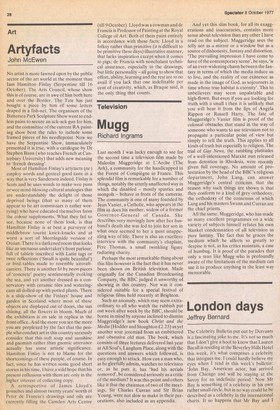Television
Mugg
Richard Ingrams
Last month I was lucky enough to see for the second time a television film made by Malcolm Muggeridge at L'Arche (The Ark), a community for the handicapped in the Forest of Compiegne in France. This splendid film is remarkable for a number of things, notably the utterly unaffected way in which the disabled — mostly spastics and mongols — behave in front of the cameras. The community is one of many founded by Jean Vanier, a Catholic, who appears in the film as does his mother, widow of a former Governor-General of Canada. She describes very movingly how after her husband's death she was led to join her son in what once seemed to her a most unappealing way of life. There is also an excellent interview with the community's chaplain, Pere Thomas, a small twinkling figure radiating charity.
Perhaps the most remarkable thing about this film however is the fact that it has never been shown on British television. Made originally for the Canadian Broadcasting Company, the BBC judged it unworthy of showing in this country. Nor was it considered suitable for a special festival of religious films held recently at Brighton.
Such an anomaly, which may seem extraordinary to all who watch the rubbish put out week after week by the BBC, should be borne in mind by anyone inclined to dismiss Muggeridge's new book Christ and the Media (Hodder and Stoughton £2.25) as yet another sour jeremiad from an embittered and obsessive old man. The book, which consists of three lectures delivered last year at All Soul's, Langham Place, along with the questions and answers which followed, is easy enough to attack. How can a man who, as he gleefully admits, watches no television or, as he puts it, has 'had his aerials removed', be considered seriously as a critic of the medium? It was this point and others like it that the chairmen of two of the meetings, Sir Charles Curran and Sir Brian Young, were not slow to make in their perorations, also included as an appendix. And yet this slim book, for all its exaggerations and inaccuracies, contains more sense about television than any other I have read on the subject. Muggeridge sees the telly not as a mirror or a window but as a source of dishonesty, fantasy and distortion. 'The prevailing impression I have come to have of the contemporary scene', he says, 'is of an ever-widening chasm between the fantasy in terms of which the media induce us to live, and the reality of our existence as made in the image of God, as sojourners in time whose true habitat is eternity'. This to unbelievers may seem unpalatable and high-flown. But even if you ate looking for truth with a small t then it is unlikely that you will hear it from the lips of Angela Rippon or Russell Harty. The fate. of Muggeridge's Vanier film is proof of the colossal obstacles that stand in the way of someone who wants to use television not to propagate .a particular point of view but simply to tell the truth. This applies to all kinds of truth but especially to religion. The trial of Gay News, the rambling platitudes of a well-intentioned Marxist nun released from detention in Rhodesia, were recently given full coverage. No amount of protestation by the head of the BBC's religious department, John Lang, can answer Muggeridge's central criticism that the reason why such things are shown is that they conform to a kind of grey orthodoxy, the orthodoxy of the consensus of which Lang and his masters Swann and Curran are the chief priests.
All the same, Muggeridge, who has made so many excellent programmes on a wide variety of subjects himself refutes his own blanket condemnation of all television as pure fantasy. The fact that he graces the medium which he affects so greatly to despise is not, as his critics maintain, a case of humbug. It is proof of the paradox that only a man like Mugg who is profoundly aware of the limitations of the medium can use it to produce anything in the least way memorable.


































 Previous page
Previous page